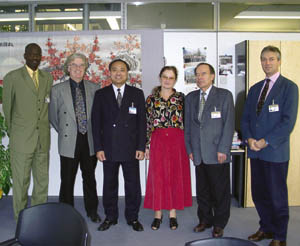Study Group 12 takes the first initiative
A meeting in Dakar, and new standards on QoS
In the spirit of encouraging, facilitating and reinforcing the participation
of African countries in meetings of the ITU Telecommunication Standardization
Sector (ITU-T), Study Group 12 held a meeting in Dakar (Senegal) late last year.
This was the first technical ITU-T Study Group meeting to take place in Africa.
France Télécom provided substantial financial support for the meeting,
which was organized by the ITU Regional Office and by the Senegalese operator,
the Société nationale des telecommunications du Sénégal (Sonatel).
France Télécom, a main holder of Sonatel and heavily involved in quality of
service (QoS) studies and developments, strongly backed this initiative of the
ITU Telecommunication Standardization Bureau (TSB). The Study Group meeting
(22-26 October) was preceded, also in Dakar, by a workshop on “QoS and
user-perceived transmission quality in evolving networks.”
 Houlin
Zhao, TSB Director (third left), holds a session shortly upon return from
Dakar to assess the results of the first technical ITU-T Study Group
meeting in Africa Houlin
Zhao, TSB Director (third left), holds a session shortly upon return from
Dakar to assess the results of the first technical ITU-T Study Group
meeting in Africa
Photo: G. Jones (ITU 020010)
|
Ibrahima Wade, General Secretary of the Government of Senegal, opened the
meeting in the presence of Michel Soual, Deputy General Director of Sonatel, and
Houlin Zhao, TSB Director. Some 31 countries, 19 of which were from
French-speaking Africa, and 14 recognized operating agencies were represented.
The QoS-oriented workshop was significant because it paved the way for Study
Group 12 to consent to the creation of a new G.1000 series of Recommendations on
“Quality of service and performance — generic and user-related aspects.”
In addition, the Study Group consented to two new Recommendations, G.1000 on
“Communications quality of service: A framework and definitions,” and G.1010
on “End-user multimedia QoS categories.” TSB acted very quickly in
discharging its AAP*-related responsibilities, making it possible for these two
Recommendations to be approved by 28 November 2001, only 35 days after consent
was declared in Dakar. Both Recommendations are noteworthy because they provide
a thread that links the work of Study Groups 2, 11, 12, 13 and 16, which deal
respectively with: the operational aspects of service provision, networks and
performance; signalling requirements and protocols; end-to-end transmission
performance of networks and terminals; multi-protocol and IP-based networks and
their internetworking; and multimedia services, systems and terminals.
| * The alternative approval process (AAP) was adopted by the
World Telecommunication Standardization Assembly in Montreal in 2000, and
launched at the end of January 2001. It aims to further reduce the
time-to-market of ITU-T standards and more closely match the industry’s
time frames and operational practices. Under this fast-track approval
procedure, an ITU-T standard can now be approved in as little as four
weeks. |
Recommendation G.1000 provides a framework that will help drive consistency
in the way in which QoS is referred to in ITU, emphasizing the fact that QoS
involves much more than just transmission quality- reliability, availability and
security are other critical components of overall service quality.
Recommendation G.1010 provides a categorization of user applications across
all bearers (speech, data, video), and thus gives a statement of what is needed,
for example, from “network QoS classes,” as given in draft Recommendation
Y.1541, to support these user applications with sufficient quality.
|
Contributed by Charles Dvorak, Vice-Chairman of ITU–T Study Group 12.
|
|